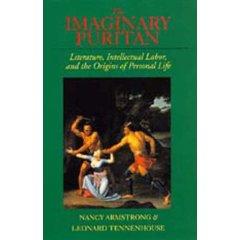| 2020ok Directory of FREE Online Books and FREE eBooks |
Free eBooks > Literature & Fiction > Books & Reading > Reference > The Imaginary Puritan: Literature, Intellectual Labor, And The Origins Of Personal Life
The Imaginary Puritan: Literature, Intellectual Labor, And The Origins Of Personal Lifeby Nancy Armstrong And Leonard Tennenhouse  Download Book (Respecting the intellectual property of others is utmost important to us, we make every effort to make sure we only link to legitimate sites, such as those sites owned by authors and publishers. If you have any questions about these links, please contact us.) link 1 About Book From Library Journal Tennenhouse and Armstrong focus on late 17th- and 18th-century American and British literature and its middle-class readership. Drawing on the most recent criticism, they demonstrate the active role of the author as the actual creator of this modern intellectual life. Their discussion concentrates on novels of captivity, from Defoe to Mary Rowlandson. Both Armstrong and Tennenhouse have published extensively; Armstrong is the author of Desire and Domestic Fiction ( LJ 3/1/87), and the two jointly edited The Ideology of Conduct (Routledge, 1987) and The Violence of Representation (Routledge, 1989). Their highly specialized treatment is appropriate for comprehensive research collections only. - Mary Margaret Benson, Linfield Coll. Lib., McMinnville, Ore. Copyright 1992 Reed Business Information, Inc. Book Description Nancy Armstrong and Leonard Tennenhouse challenge traditional accounts of the origins of modern Anglo-American culture by focusing on the emergence of print culture in England and the North American colonies. They postulate a modern middle class that consisted of authors and intellectuals who literally wrote a new culture into being. Milton's Paradise Lost marks the emergence of this new literacy. The authors show how Milton helped transform English culture into one of self-enclosed families made up of self-enclosed individuals. However, the authors point out that the popularity of Paradise Lost was matched by that of the Indian captivity narratives that flowed into England from the American colonies. Mary Rowlandson's account of her forcible separation from the culture of her origins stresses the ordinary person's ability to regain those lost origins, provided she remains truly English. In a colonial version of the Miltonic paradigm, Rowlandson sought to return to a family of individuals much like the one in Milton's depiction of the fallen world. Thus the origin both of modern English culture and of the English novel are located in North America. American captivity narratives formulated the ideal of personal life that would be reproduced in the communities depicted by Defoe, Richardson, and later domestic fiction. From the Inside Flap "A tour de force that reconceptualizes literary history and repositions British literature to claim the imperial and trans-Atlantic origins of the British novel. "--Carroll Smith-Rosenberg, author of Disorderly Conduct "A very exciting piece of work, with important implications for how we conceive projects in literary, intellectual, and cultural history. . . . It is sure to be a controversial study, but it will get serious attention, not just as a study of 'novels' and texts but as a provocative account of English history and of models for studying history."--J. Paul Hunter, author of Before Novels From the Back Cover "A tour de force that reconceptualizes literary history and repositions British literature to claim the imperial and trans-Atlantic origins of the British novel. " (Carroll Smith-Rosenberg, author of Disorderly Conduct) About the Author Nancy Armstrong is Nancy Duke Lewis Professor of Comparative Literature, English, and Modern Culture and Media at Brown University. Leonard Tennenhouse is Adjunct Professor of Comparative Literature and Modern Culture and Media at Brown University. Related Free eBooks
| Related Tags |












SEND A COMMENT
PLEASE READ: All comments must be approved before appearing in the thread; time and space constraints prevent all comments from appearing. We will only approve comments that are directly related to the article, use appropriate language and are not attacking the comments of others.